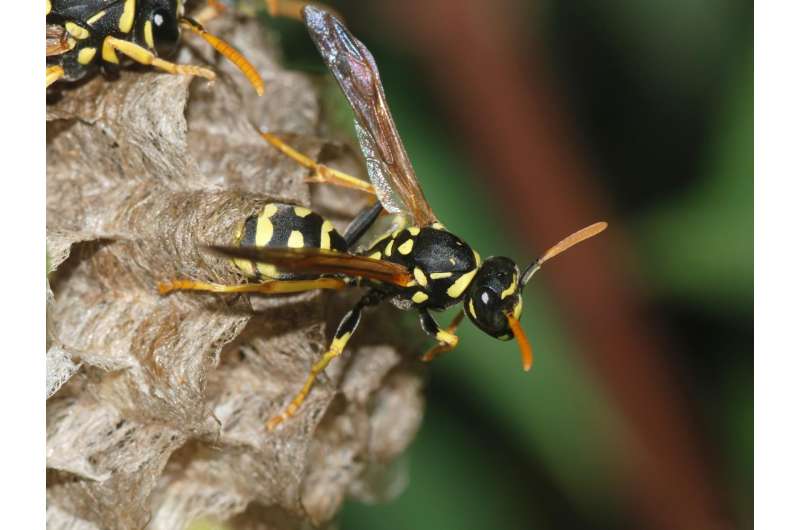March 6, 2017 report
Wasp offspring found to take on the personality of the queen

A small team of researchers with members from the University of California and the University of Michigan has found that some personality traits unique to a queen wasp are passed down to her offspring, the worker wasps. In their paper published in the journal Animal Behaviour, the team describes how they collected wasp nests in the wild and brought them back to their lab for personality trait studies and what they found.
Prior research has shown that even insects have some degree of uniqueness of personality—some bees are more stubborn than others, while some others are more aggressive, etc. In this new effort, the researchers sought to learn more about how the personality of a wasp queen might impact her offspring which make up the majority of the members of a nest.
To learn more, they went out into the field and pulled wasp nests from buildings in their local area and brought them back to their lab. The team then used tiny paint brushes to reach inside of a nest and jab the queen multiple times. They found that some queens simply put up with it (even after 50 jabs), others flew off after just a couple of jabs. The more aggressive ones stung the brush. Realizing they could not poke each of the other members of the hive to see how their personalities compared to their queen mother, the researchers instead took a collective look—they shook the nests and introduced a pendulum to suggest a possible predator and then observed how the wasps responded as a group.
The team reports that the wasps responded in ways that were reminiscent of their queen—those born to a stubborn queen were less likely to leave the nest when it was "under attack" for example, while those born to an aggressive queen were quite willing to attack the metronome.
The researchers suggest the personality traits of the mother might confer different types of survival tactics to her offspring. Those that are more aggressive might be more inclined to attack more dangerous predators, for example, putting the nest at greater risk. Or stubborn wasps might be slow to attack, leaving the nest more vulnerable to a threat.
The researchers next plan to look closer at the wasps to see if their personality traits can be found in their genes.
More information: Colin M. Wright et al. Queen personality type predicts nest-guarding behaviour, colony size and the subsequent collective aggressiveness of the colony, Animal Behaviour (2017). DOI: 10.1016/j.anbehav.2016.11.025
Journal information: Animal Behaviour
© 2017 Phys.org



















